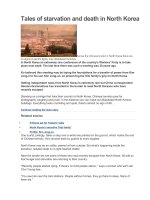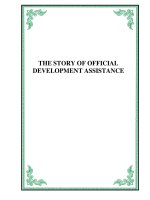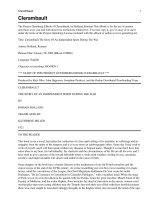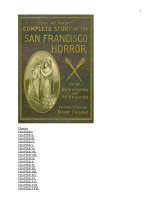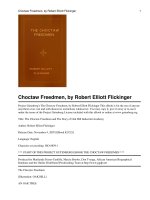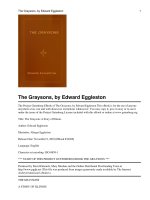The story of the volsungs
Bạn đang xem bản rút gọn của tài liệu. Xem và tải ngay bản đầy đủ của tài liệu tại đây (811.7 KB, 199 trang )
ProjectGutenberg'sTheStoryoftheVolsungs,(VolsungaSaga),byAnonymous
ThiseBookisfortheuseofanyoneanywhereatnocostandwith
almostnorestrictionswhatsoever.Youmaycopyit,giveitawayor
re-useitunderthetermsoftheProjectGutenbergLicenseincluded
withthiseBookoronlineatwww.gutenberg.org
Title:TheStoryoftheVolsungs,(VolsungaSaga)
WithExcerptsfromthePoeticEdda
Author:Anonymous
ReleaseDate:August7,2008[EBook#1152]
LastUpdated:January15,2013
Language:English
***STARTOFTHISPROJECTGUTENBERGEBOOKTHESTORYOFTHEVOLSUNGS***
ProducedbyDouglasB.Killings,andDavidWidger
THESTORYOFTHEVOLSUNGS,
(VOLSUNGASAGA)
WITHEXCERPTSFROMTHEPOETICEDDA
ByAnonymous
Originally written in Icelandic (Old Norse) in the thirteenth century
A.D., by an unknown hand. However, most of the material is based
substantially on previous works, some centuries older. A few of these
workshavebeenpreservedinthecollectionofNorsepoetryknownas
the"PoeticEdda".
The text of this edition is based on that published as "The Story of
the Volsungs", translated by William Morris and Eirikr Magnusson
(WalterScottPress,London,1888).
DouglasB.Killings
SELECTEDBIBLIOGRAPHY:RECOMMENDEDREADING—
Anonymous: "Kudrun", Translated by Marion E. Gibbs & Sidney
Johnson(GarlandPub.,NewYork,1992).
Anonymous: "Nibelungenlied", Translated by A.T. Hatto (Penguin
Classics,London,1962).
Saxo Grammaticus: "The First Nine Books of the Danish History",
Translated by Oliver Elton (London, 1894; Reissued by the Online
MedievalandClassicalLibraryasE-TextOMACL#28,1997).
CONTENTS
INTRODUCTION
TRANSLATORS'PREFACE.
THESTORYOFTHEVOLSUNGSANDNIBLUNGS.
CHAPTERI.OfSigi,theSonofOdin
CHAPTERII. Of the Birth of Volsung, the Son of Rerir, who
wastheSonofSigi
CHAPTERIII.OftheSwordthatSigmund,Volsung'sson,drew
fromtheBranstock
CHAPTERIV.HowKingSiggeirweddedSigny,andbadeKing
VolsungandhissontoGothland
CHAPTERV.OftheSlayingofKingVolsung
CHAPTER VI. Of how Signy sent the Children of her and
SiggeirtoSigmund
CHAPTERVII.OftheBirthofSinfjotlitheSonofSigmund
CHAPTERVIII.TheDeathofKingSiggeirandofSigny
CHAPTER IX. How Helgi, the son of Sigmund, won King
HodbrodandhisRealm,andweddedSigrun
CHAPTERX.TheendingofSinfjotli,Sigmund'sSon
CHAPTERXI. Of King Sigmund's last Battle, and of how he
mustyielduphisSwordagain
CHAPTER XII. Of the Shards of the Sword Gram, and how
HjordiswenttoKingAlf
CHAPTERXIII. Of the Birth and Waxing of Sigurd Fafnir'sbane
CHAPTERXIV. Regin's tale of his Brothers, and of the Gold
calledAndvari'sHoard
CHAPTERXV. Of the Welding together of the Shards of the
SwordGram
CHAPTERXVI.TheprophecyofGrifir
CHAPTERXVII.OfSigurd'sAvengingofSigmundhisFather
CHAPTERXVIII.OftheSlayingoftheWormFafnir
CHAPTERXIX.OftheSlayingofRegin,SonofHreidmar
CHAPTER XX. Of Sigurd's Meeting with Brynhild on the
Mountain
CHAPTERXXI.MoreWiseWordsofBrynhild
CHAPTER XXII. Of the Semblance and Array of Sigurd
Fafnir's-bane
CHAPTERXXIII.SigurdcomestoHlymdale
CHAPTERXXIV.SigurdseesBrynhildatHlymdale
CHAPTERXXV.OftheDreamofGudrun,Giuki'sdaughter
CHAPTERXXVI.SigurdcomestotheGiukingsandiswedded
toGudrun
CHAPTERXXVII.TheWooingofBrynhild
CHAPTER XXVIII. How the Queens held angry converse
togetherattheBathing
CHAPTERXXIX.OfBrynhild'sgreatGriefandMourning
CHAPTERXXX.OftheSlayingofSigurdFafnir's-bane
CHAPTERXXXI. Of the Lamentation of Gudrun over Sigurd
dead,asitistoldtoldinancientSongs
CHAPTERXXXII.OftheEndingofBrynhild
CHAPTERXXXIII.GudrunweddedtoAtli
CHAPTERXXXIV.AtlibidstheGiukingstohim
CHAPTERXXXV.TheDreamsoftheWivesoftheGiukings
CHAPTERXXXVI.OftheJourneyoftheGiukingstoKingAtli
CHAPTERXXXVII.TheBattleintheBurgofKingAtli
CHAPTERXXXVIII.OftheslayingoftheGiukings
CHAPTERXXXIX.TheEndofAtliandhisKinandFolk
CHAPTERXL.HowGudruncastherselfintotheSea,butwas
broughtashoreagain
CHAPTERXLI.OftheWeddingandSlayingofSwanhild
CHAPTERXLII.GudrunsendsherSonstoavengeSwanhild
CHAPTERXLIII.TheLatterEndofalltheKinoftheGiukings
APPENDIX:EXCERPTSFROMTHEPOETICEDDA.
PART OF THE SECOND LAY OF HELGI
HUNDINGS-BANE(1)
PARTOFTHELAYOFSIGRDRIFA(1)
THELAYCALLEDTHESHORTLAYOFSIGURD.
THEHELL-RIDEOFBRYNHILD.
FRAGMENTSOFTHELAYOFBRYNHILD
THESECONDORANCIENTLAYOFGUDRUN.
THESONGOFATLI.
THEWHETTINGOFGUDRUN.
THELAYOFHAMDIR
THELAMENTOFODDRUN.
INTRODUCTION
ItwouldseemfittingforaNorthernfolk,derivingthegreaterandbetterpart
oftheirspeech,laws,andcustomsfromaNorthernroot,thattheNorthshouldbe
tothem,ifnotaholyland,yetatleastaplacemoretoberegardedthananypart
oftheworldbeside;thathowsoevertheirknowledgewidenedofothermen,the
faithanddeedsoftheirforefatherswouldneverlackinterestforthem,butwould
alwaysbekeptinremembrance.Onecauseafteranotherhas,however,aidedin
turningattentiontoclassicmenandlandsatthecostofourownhistory.Among
battles, "every schoolboy" knows the story of Marathon or Salamis, while it
wouldbehardindeedtofindonewhodidmorethanrecognisethename,ifeven
that,ofthegreatfightsofHafrsfirthorSticklestead.Thelanguageandhistoryof
Greece and Rome, their laws and religions, have been always held part of the
learningneedfultoaneducatedman,butnotroublehasbeentakentomakehim
familiarwithhisownpeopleortheirtongue.EventhatEnglishmanwhoknew
Alfred, Bede, Caedmon, as well as he knew Plato, Caesar, Cicero, or Pericles,
would be hard bestead were he asked about the great peoples from whom we
sprang;thewarringofHaroldFairhairorSaintOlaf;theViking(1)kingdomsin
these(theBritish)WesternIsles;thesettlementofIceland,orevenofNormandy.
Theknowledgeofallthesethingswouldnowbeevensmallerthanitisamong
uswereitnotthattherewasonelandleftwheretheoldenlearningfoundrefuge
andwaskeptinbeing.InEngland,Germany,andtherestofEurope,whatisleft
ofthetraditionsofpagantimeshasbeenalteredinathousandwaysbyforeign
influence, even as the peoples and their speech have been by the influx of
foreign blood; but Iceland held to the old tongue that was once the universal
speechofnorthernfolk,andheldalsothegreatstoresoftaleandpoemthatare
slowly becoming once more the common heritage of their descendants. The
truth, care, and literary beauty of its records; the varied and strong life shown
alike in tale and history; and the preservation of the old speech, character, and
tradition—apeopleplacedapartastheIcelandershavebeen—combinetomake
valuable what Iceland holds for us. Not before 1770, when Bishop Percy
translated Mallet's "Northern Antiquities", was anything known here of
Icelandic,oritsliterature.Onlywithinthelatterpartofthiscenturyhasitbeen
studied,andinthebriefbook-listattheendofthisvolumemaybeseenthelittle
that has been done as yet. It is, however, becoming ever clearer, and to an
increasingnumber,howsupremelyimportantisIcelandicasaword-hoardtothe
English-speakingpeoples,andthatinitslegend,song,andstorythereisavery
mine of noble and pleasant beauty and high manhood. That which has been
done, one may hope, is but the beginning of a great new birth, that shall give
backtoourlanguageandliteratureallthatheedlessnessandignorancebidfair
forawhiletodestroy.
The Scando-Gothic peoples who poured southward and westward over
Europe, to shake empires and found kingdoms, to meet Greek and Roman in
conflict, and levy tribute everywhere, had kept up their constantly-recruited
wavesofincursion,untiltheyhadraisedabarrieroftheirownblood.Itwastheir
own kin, the sons of earlier invaders, who stayed the landward march of the
NorthmeninthetimeofCharlemagne.TotheSouthlandstheirroadbylandwas
henceforth closed. Then begins the day of the Vikings, who, for two hundred
yearsandmore,"heldtheworldatransom."Undermanyandbraveleadersthey
first of all came round the "Western Isles" (2) toward the end of the eighth
century; soon after they invaded Normandy, and harried the coasts of France;
gradually they lengthened their voyages until there was no shore of the then
knownworlduponwhichtheywereunseenorunfelt.AglanceatEnglishhistory
willshowthelargepartofittheyfill,andhowtheytooktributefromtheAngloSaxons,who,bytheway,werefarnearerkintothemthanisusuallythought.In
Ireland,wheretheoldcivilisationwasfallingtopieces,theyfoundedkingdoms
atLimerickandDublinamongotherplaces;(3)thelastnamed,ofwhichthefirst
king, Olaf the White, was traditionally descended of Sigurd the Volsung, (4)
endured even to the English invasion, when it was taken by men of the same
Vikingbloodalittlealtered.Whateffecttheyproduceduponthenativesmaybe
seen from the description given by the unknown historian of the "Wars of the
GaedhilwiththeGaill":"Inaword,althoughtherewereanhundredhard-steeled
ironheadsononeneck,andanhundredsharp,ready,cool,never-rustingbrazen
tongues in each head, and an hundred garrulous, loud, unceasing voices from
eachtongue,theycouldnotrecount,ornarrate,orenumerate,ortellwhatallthe
Gaedhil suffered in common—both men and women, laity and clergy, old and
young, noble and ignoble—of hardship, and of injury, and of oppression, in
every house, from these valiant, wrathful, purely pagan people. Even though
greatwerethiscruelty,oppression,andtyranny,thoughnumerousweretheoftvictorious clans of the many-familied Erinn; though numerous their kings, and
their royal chiefs, and their princes; though numerous their heroes and
champions,andtheirbravesoldiers,theirchiefsofvalourandrenownanddeeds
ofarms;yetnotoneofthemwasabletogiverelief,alleviation,ordeliverance
from that oppression and tyranny, from the numbers and multitudes, and the
cruelty and the wrath of the brutal, ferocious, furious, untamed, implacable
hordesbywhomthatoppressionwasinflicted,becauseoftheexcellenceoftheir
polished, ample, treble, heavy, trusty, glittering corslets; and their hard, strong,
valiantswords;andtheirwell-rivetedlongspears,andtheirready,brilliantarms
ofvalourbesides;andbecauseofthegreatnessoftheirachievementsandoftheir
deeds,theirbravery,andtheirvalour,theirstrength,andtheirvenom,andtheir
ferocity,andbecauseoftheexcessoftheirthirstandtheirhungerforthebrave,
fruitful, nobly-inhabited, full of cataracts, rivers, bays, pure, smooth-plained,
sweetgrassylandofErinn"—(pp.52-53).Somepartofthis,however,mustbe
abated,becausethechroniclerisexaltingtheterror-strikingenemythathemay
still further exalt his own people, the Dal Cais, who did so much under Brian
BoroimhetochecktheinroadsoftheNorthmen.Whenabookdoes(5)appear,
whichhasbeenannouncedthesetenyearspast,weshallhavemorematerialfor
the reconstruction of the life of those times than is now anywhere accessible.
VikingearldomsalsoweretheOrkneys,Faroes,andShetlands.Solateas1171,
inthereignofHenryII.,theyearafterBeckett'smurder,EarlSweynAsleifsson
ofOrkney,whohadlongbeentheterrorofthewesternseas,"faredasea-roving"
andscouredthewesterncoastofEngland,Man,andtheeastofIreland,butwas
killedinanattackonhiskinsmenofDublin.Hehadusedtogouponaregular
plan that may be taken as typical of the homely manner of most of his like in
their cruising: "Sweyn had in the spring hard work, and made them lay down
verymuchseed,andlookedmuchafterithimself.Butwhenthattoilwasended,
he fared away every spring on a viking-voyage, and harried about among the
southern isles and Ireland, and came home after midsummer. That he called
spring-viking.Thenhewasathomeuntilthecorn-fieldswerereapeddown,and
thegrainseentoandstored.Thenhefaredawayonaviking-voyage,andthenhe
did not come home till the winter was one month off, and that he called his
autumn-viking."(6)
Toward the end of the ninth century Harold Fairhair, either spurred by the
example of Charlemagne, or really prompted, as Snorri Sturluson tells us,
resolved to bring all Norway under him. As Snorri has it in "Heimskringla":
"KingHaroldsenthismentoagirlhightGyda....Thekingwantedherforhis
leman;forshewaswondrousbeautifulbutofhighmoodwithal.Nowwhenthe
messengerscamethereandgavetheirmessagetoher,shemadeanswerthatshe
wouldnotthrowherselfawayeventotakeakingforherhusband,whoswayed
nogreaterkingdomthanafewdistricts;'Andmethinks,'saidshe,'itisamarvel
thatnokinghereinNorwaywillputallthelandunderhim,afterthefashionthat
GormtheOlddidinDenmark,orEricatUpsala.'Themessengersdeemedthisa
dreadfullyproud-spokenanswer,andaskedherwhatshethoughtwouldcomeof
suchanone,forHaroldwassomightyamanthathisaskingwasgoodenough
forher.Butalthoughshehadrepliedtotheirsayingotherwisethantheywould,
theysawnolikelihood,forthiswhile,ofbearingheralongwiththemagainsther
will,sotheymadereadytofarebackagain.Whentheywerereadyandthefolk
followedthemout,Gydasaidtothemessengers—'NowtelltoKingHaroldthese
my words:—I will only agree to be his lawful wife upon the condition that he
shallfirst,forsakeofme,putunderhimthewholeofNorway,sothathemay
bearswayoverthatkingdomasfreelyandfullyasKingEricovertherealmof
Sweden,orKingGormoverDenmark;foronlythen,methinks,canhebecalled
king of a people.' Now his men came back to King Harold, bringing him the
wordsofthegirl,andsayingshewassoboldandheedlessthatshewelldeserved
the king should send a greater troop of people for her, and put her to some
disgrace.Thenansweredtheking.'Thismaidhas notspokenordonesomuch
amissthatsheshouldbepunished,buttherathershouldshebethankedforher
words. She has reminded me,' said he, 'of somewhat that it seems wonderful I
didnotthinkofbefore.Andnow,'addedhe,'Imakethesolemnvow,andtake
whomademeandrulesoverallthings,towitnessthatnevershallIcliporcomb
myhairuntilIhavesubduedallNorwaywithscatt,andduties,andlordships;or,
ifnot,havediedin theseeking.'Guttorm gave greatthanksto thekingforhis
oath, saying it was "royal work fulfilling royal rede." The new and strange
governmentthatHaroldtriedtoenforce—nothinglessthanthefeudalsystemin
aroughguise—whichmadethosewhohadhithertobeentheirownmensaveat
special times, the king's men at all times, and laid freemen under tax, was
withstood as long as might be by the sturdy Norsemen. It was only by dint of
hardfightingthatheslowlywonhisway,untilatHafrsfirthhefinallycrushedall
effective opposition. But the discontented, "and they were a great multitude,"
fledoverseatotheoutlands,Iceland,theFaroes,theOrkneys,andIreland.The
whole coast of Europe, even to Greece and the shores of the Black Sea, the
northernshoresofAfrica,andthewesternpartofAsia,felttheeffectsalso.Rolf
Pad-th'-hoof,sonofHarold'sdearfriendRognvald,madeanoutlawforacattleraidwithintheboundsofthekingdom,betookhimselftoFrance,and,withhis
men,foundedanewpeopleandadynasty.
Icelandhadbeenknownforagoodmanyyears,butitsonlydwellershadbeen
IrishCuldees,whosoughtthatlonelylandtoprayinpeace.Now,however,both
from Norway and the Western Isles settlers began to come in. Aud, widow of
OlaftheWhite,KingofDublin,came,bringingwithhermanyofmixedblood,
for the Gaedhil (pronounced "Gael", Irish) and the Gaill (pronounced "Gaul",
strangers) not only fought furiously, but made friends firmly, and often
intermarried. Indeed, the Westmen were among the first arrivals, and took the
bestpartsoftheisland—onitswesternshore,appropriatelyenough.Afteratime
the Vikings who had settled in the Isles so worried Harold and his kingdom,
upon which they swooped every other while, that he drew together a mighty
force,andfelluponthemwheresoeverhecouldfindthem,andfollowedthemup
with fire and sword; and this he did twice, so that in those lands none could
abidebutfolkwhowerecontenttobehismen,howeverlightlytheymighthold
theirallegiance.HenceitwastoIcelandthatallturnedwhoheldtotheoldways,
andforoversixty yearsfromthe firstcomertherewasastreamofhardymen
pouring in, with their families and their belongings, simple yeomen, great and
warwisechieftains,richlandowners,whohadlefttheirland"fortheoverbearing
ofKingHarold,"asthe"Landnamabok"(7)hasit."Therealsoweshallescape
thetroublingofkingsandscoundrels",saysthe"Vatsdaelasaga".Somuchofthe
best blood left Norway that the king tried to stay the leak by fines and
punishments,butinvain.
Ashisshipnearedtheshore,thenew-comingchiefwouldleaveittothegods
astowherehesettled.Thehallowedpillarsofthehighseat,whichwerecarried
awayfromhisoldabode,werethrownoverboard,withcertainrites,andwerelet
drivewithwindandwaveuntiltheycameashore.Thepieceoflandwhichlay
next the beach they were flung upon was then viewed from the nearest hillsummit,andplaceofthehomesteadpickedout.Thenthelandwashallowedby
being encircled with fire, parcelled among the band, and marked out with
boundary-signs; the houses were built, the "town" or home-field walled in, a
templeputup,andthesettlementsoonassumedshape.In1100therewere4500
franklins,makingapopulationofabout50,000,fullythree-fourthsofwhomhad
a strong infusion of Celtic blood in them. The mode of life was, and is, rather
pastoralthanaughtelse.Inthe39,200squaremilesoftheisland'sareathereare
nowabout250acresofcultivatedland,andalthoughtherehasbeenmuchmore
intimespast,theIcelandershavealwaysbeenforcedtoreckonuponflocksand
herdsastheirchiefresources,grainofallkinds,evenrye,onlygrowinginafew
favouredplaces,andveryrarelythere;thehay,self-sown,beingtheonlycertain
harvest. On the coast fishing and fowling were of help, but nine-tenths of the
folklivedbytheirsheepandcattle.Potatoes,carrots,turnips,andseveralkinds
ofcabbagehave,however,beenlatelygrownwithsuccess.Theyproducedtheir
own food and clothing, and could export enough wool, cloth, horn, dried fish,
etc., as enabled them to obtain wood for building, iron for tools, honey, wine,
grain,etc, totheextentoftheirsimpleneeds.Lifeandworkwaslottedbythe
seasons and their changes; outdoor work—fishing, herding, hay-making, and
fuel-getting—filling the long days of summer, while the long, dark winter was
usedinweavingandahundredindoorcrafts.Theclimateisnotsobadasmight
beexpected,seeingthattheislandtouchesthepolarcircle,themeantemperature
atReykjavikbeing39degrees.
The religion which the settlers took with them into Iceland—the ethnic
religionoftheNorsefolk,whichfoughtitslastgreatfightatSticklestead,where
OlafHaraldssonlosthislifeandwonthenameofSaint—was,likeallreligions,
a compound of myths, those which had survived from savage days, and those
whichexpressedthevariousdegreesofagrowingknowledgeoflifeandbetter
understandingofnature.Somehistoriansandcommentatorsarestillfondofthe
unscientific method of taking a later religion, in this case christianity, and
writingdownallapparentlycoincidentpartsofbelief,ashavingbeenborrowed
from the christian teachings by the Norsefolk, while all that remain they lump
undersomeslightinghead.Everyfolkhasfromthebeginningoftimesoughtto
explain the wonders of nature, and has, after its own fashion, set forth the
mysteriesoflife.Thelowestsavage,nolessthanhismoreadvancedbrother,has
aphilosophyoftheuniversebywhichhesolvestheworld-problemtohisown
satisfaction,andseekstoreconcilehisconductwithhisconceptionofthenature
ofthings.Now,itisnottobethought,saveby"apriori"reasoners,thatsucha
folk as the Northmen—a mighty folk, far advanced in the arts of life,
imaginative, literary—should have had no further creed than the totemistic
mythsoftheirprimitivestate;astatetheyhavewhollylefteretheyenterhistory.
Judgingfromuniversalanalogy,thereligionofwhichrecordremainstouswas
just what might be looked for at the particular stage of advancement the
Northmenhadreached.Ofcoursesomethingmayhavebeengainedfromcontact
withotherpeoples—fromtheGreeksduringthelongyearsinwhichthenorthern
races pressed upon their frontier; from the Irish during the existence of the
westernviking-kingdoms;butwhatIparticularlywarnyoungstudentsagainstis
theconstanteffortofacertainorderofmindstowrestfactsintoagreementwith
their pet theories of religion or what not. The whole tendency of the more
moderninvestigationshowsthattheperiodofmyth-transmissionislongoverere
historybegins.Thesameconfusionofdifferentstagesofmyth-makingistobe
foundintheGreekreligion,andindeedinthoseofallpeoples;similarconditions
of mind produce similar practices, apart from all borrowing of ideas and
manners; in Greece we find snake-dances, bear-dances, swimming with sacred
pigs,leapingaboutinimitationofwolves,dog-feasts,andofferingofdogs'flesh
to the gods—all of them practices dating from crude savagery, mingled with
ideas of exalted and noble beauty, but none now, save a bigot, would think of
accusing the Greeks of having stolen all their higher beliefs. Even were some
partofthematteroftheirmythstakenfromothers,yettheNorsemenhavegiven
theirgodsanoble,upright,greatspirit,andplacedthemuponahighlevelthatis
alltheirown.(8)FromtheproseEddathefollowingalltoobriefstatementofthe
salientpointsofNorsebeliefismadeup:—"Thefirstandeldestofgodsishight
Allfather; he lives from all ages, and rules over all his realm, and sways all
things great and small; he smithied heaven and earth, and the lift, and all that
belongstothem;whatismost,hemademan,andgavehimasoulthatshalllive
and never perish; and all men that are right-minded shall live and be with
himselfinVingolf;butwickedmenfaretoHell,andthenceintoNiithell,thatis
beneathintheninthworld.Beforetheearth''twasthemorningoftime,whenyet
naught was, nor sand nor sea was there, nor cooling streams. Earth was not
found,norHeavenabove;aYawning-gaptherewas,butgrassnowhere.'Many
ageseretheearthwasshapenwasNiflheimmade,butfirstwasthatlandinthe
southernspherehightMuspell,thatburnsandblazes,andmaynotbetroddenby
thosewhoareoutlandishandhavenoheritagethere.Surtrsitsontheborderto
guardtheland;attheendoftheworldhewillfareforth,andharryandovercome
allthegodsandburntheworldwithfire.Eretheraceswereyetmingled,orthe
folkofmengrew,Yawning-gap,whichlookedtowardsthenorthparts,wasfilled
withthickandheavyiceandrime,andeverywherewithinwerefogandgusts;
butthesouthsideofYawning-gaplightenedbythesparksandgledesthatflew
outofMuspell-heim;ascoldaroseoutofNiflheimandallthingsgrim,sowas
that part that looked towards Muspell hot and bright; but Yawning-gap was as
lightaswindlessair,andwhentheblastofheatmettherime,sothatitmelted
anddroppedandquickened;fromthoselife-dropstherewasshapedthelikeness
ofaman,andhewasnamedYmir;hewasbad,andallhiskind;andsoitissaid,
whenheslepthefellintoasweat;thenwaxedunderhislefthandamananda
woman, and one of his feet got a son with the other, and thence cometh the
Hrimthursar. The next thing when the rime dropped was that the cow hight
Audhumlawasmadeofit;butfourmilk-riversranoutofherteats,andshefed
Ymir;shelickedrime-stonesthatweresalt,andthefirstdaytherecameateven,
outofthestones,aman'shair,theseconddayaman'shead,thethirddayallthe
manwasthere.HeisnamedTuri;hewasfairofface,greatandmighty;hegata
sonnamedBor,whotooktohimBesla,daughterofBolthorn,thegiant,andthey
hadthreesons,Odin,Vili,andVe.Bor'ssonsslewYmirthegiant,butwhenhe
fellthereransomuchbloodoutofhiswoundsthatallthekinoftheHrimthursar
were drowned, save Hvergelmir and his household, who got away in a boat.
Then Bor's sons took Ymir and bore him into the midst of Yawning-gap, and
madeofhimtheearth;ofhisbloodseasandwaters,ofhisfleshearthwasmade;
they set the earth fast, and laid the sea round about it in a ring without; of his
bonesweremaderocks;stonesandpebblesofhisteethandjawsandthebones
thatwerebroken;theytookhisskullandmadetheliftthereof,andsetitupover
theearthwithfoursides,andundereachcornertheysetdwarfs,andtheytook
hisbrainandcastitaloft,andmadeclouds.Theytookthesparksandgledesthat
wentloose,andhadbeencastoutofMuspellheim,andsettheminthelifttogive
light; they gave resting-places to all fires, and set some in the lift; some fared
freeunderit,andtheygavethemaplaceandshapedtheirgoings.Awondrous
greatsmithying,anddeftlydone.Theearthisfashionedroundwithout,andthere
beyond, round about it lies the deep sea; and on that sea-strand the gods gave
land for an abode to the giant kind, but within on the earth made they a burg
roundtheworldagainstrestlessgiants,andforthisburgrearedtheythebrowsof
Ymir, and called the burg Midgard. The gods went along the sea-strand and
foundtwostocks,andshapedoutofthemmen;thefirstgavesoulandlife,the
secondwitandwilltomove,thethirdface,hearing,speech,andeyesight.They
gavethemclothingandnames;themanAskandthewomanEmbla;thencewas
mankindbegotten,towhomanabodewasgivenunderMidgard.ThennextBor's
sons made them a burg in the midst of the world, that is called Asgard; there
abodethegodsandtheirkind,andwroughtthencemanytidingsandfeats,both
onearthandintheSky.Odin,whoishightAllfather,forthatheisthefatherof
all men and sat there in his high seat, seeing over the whole world and each
man's doings, and knew all things that he saw. His wife was called Frigg, and
their offspring is the Asa-stock, who dwell in Asgard and the realms about it,
and all that stock are known to be gods. The daughter and wife of Odin was
Earth, and of her he got Thor, him followed strength and sturdiness, thereby
quells he all things quick; the strongest of all gods and men, he has also three
thingsofgreatprice,thehammerMiolnir,thebestofstrengthbelts,andwhenhe
girdsthatabouthimwaxeshisgodstrengthone-half,andhisironglovesthathe
maynotmissforholdinghishammer'shaft.BalidrisOdin'ssecondson,andof
himitisgoodtosay,heisfairand:brightinface,andhair,andbody,andhimall
praise;heiswiseandfair-spokenandmild,andthatnatureisinhimnonemay
withstand his doom. Tyr is daring and best of mood; there is a saw that he is
tyrstrongwhoisbeforeothermenandneveryields;heisalsosowisethatitis
said he is tyrlearned who is wise. Bragi is famous for wisdom, and best in
tongue-wit,andcunningspeech,andsong-craft.'Andmanyotherarethere,good
andgreat;andone,Loki,fairofface,illintemperandfickleofmood,iscalled
the backbiter of the Asa, and speaker of evil redes and shame of all gods and
men;hehasaboveallthatcraftcalledsleight,andcheatsallinallthings.Among
thechildrenofLokiareFenris-wolfandMidgards-worm;thesecondliesabout
alltheworldinthedeepsea,holdinghistailinhisteeth,thoughsomesayThor
hasslainhim;butFenris-wolfisbounduntilthedoomofthegods,whengods
andmenshallcometoanend,andearthandheavenbeburnt,whenheshallslay
Odin.Afterthistheearthshootsupfromthesea,anditisgreenandfair,andthe
fieldsbearunsown,andgodsandmenshallbealiveagain,andsitinfairhalls,
andtalkofoldtalesandthetidingsthathappenedaforetime.Thehead-seat,or
holiest-stead, of the gods is at Yggdrasil's ash, which is of all trees best and
biggest;itsboughsarespreadoverthewholeworldandstandaboveheaven;one
rootoftheashisinheaven,andundertherootistherightholyspring;therehold
thegodsdoomeveryday;thesecondrootiswiththeHrimthursar,wherebefore
wasYawning-gap;underthatrootisMimir'sspring,whereknowledgeandwit
liehidden;thithercameAllfatherandbeggedadrink,butgotitnotbeforeheleft
hiseyeinpledge;thethirdrootisoverNiflheim,andthewormNidhogggnaws
the root beneath. A fair hall stands under the ash by the spring, and out of it
come three maidens, Norns, named Has-been, Being, Will-be, who shape the
livesofmen;therearebesideotherNorns,whocometoeverymanthatisborn
toshapehislife,andsomeofthesearegoodandsomeevil.Intheboughsofthe
ashsitsaneagle,wiseinmuch,andbetweenhiseyessitsthehawkVedrfalnir;
the squirrel Ratatoskr runs up and down along the ash, bearing words of hate
betwixttheeagleandtheworm.ThoseNornswhoabidebytheholyspringdraw
fromiteverydaywater,andtaketheclaythatliesaroundthewell,andsprinkle
themupovertheashforthatitsboughsshouldnotwitherorrot.Allthosemen
that have fallen in the fight, and borne wounds and toil unto death, from the
beginningoftheworld,arecometoOdininValhall;averygreatthrongisthere,
and many more shall yet come; the flesh of the boar Soerfmnir is sodden for
them every day, and he is whole again at even; and the mead they drink that
flowsfromtheteatsoftheshe-goatHeidhrun.ThemeatOdinhasonhisboard
hegivestohistwowolves,GeriandFreki,andheneedsnomeat,wineistohim
bothmeatanddrink;ravenstwainsitonhisshoulders,andsayintohisearall
tidings that they see and hear; they are called Huginn and Muninn (mind and
memory); them sends he at dawn to fly over the whole world, and they come
back at breakfast-tide, thereby becomes he wise in many tidings, and for this
mencallhimRaven's-god.Everyday,whentheyhaveclothedthem,theheroes
putontheirarmsandgooutintotheyardandfightandfelleachother;thatis
their play, and when it looks toward mealtime, then ride they home to Valhall
andsitdowntodrink.Formurderersandmenforswornisagreathall,andabad,
and the doors look northward; it is altogether wrought of adder-backs like a
wattledhouse,buttheworms'headsturnintothehouse,andblowvenom,sothat
rivers of venom run along the hall, and in those rivers must such men wade
forever." There was no priest-class; every chief was priest for his own folk,
offeredsacrifice,performedceremonies,andsoon.
Inpoliticsthehomestead,withitsfranklin-owner,wastheunit;the"thing",or
hundred-moot,theprimalorganisation,andthe"godord",orchieftainship,itstie.
The chief who had led a band of kinsmen and followers to the new country,
takenpossessionofland,andshareditamongthem,becametheirhead-rulerand
priestathome,speakerandpresidentoftheirThing,andtheirrepresentativein
anydealingswithneighbouringchiefsandtheirclients.Hewasnotafeudallord,
for any franklin could change his "godord" as he liked, and the right of
"judgment by peers" was in full use. At first there was no higher organisation
thanthelocalthing.Acentralthing,andaspeakertospeakasingle"law"forthe
wholeisland,wasinstitutedin929,andafterwardstheislandwasdividedinfour
quarters, each with a court, under the Al-thing. Society was divided only into
twoclassesofmen,thefreeandunfree,thoughpoliticalpowerwasinthehands
of the franklins alone; "godi" and thrall ate the same food, spoke the same
tongue, wore much the same clothes, and were nearly alike in life and habits.
Amongthefreementherewasequalityinallbutwealthandthesocialstanding
thatcannotbeseparatedtherefrom.Thethrallwasaserfratherthanaslave,and
couldownahouse,etc.,ofhisown.Inagenerationorsothefreemanorlandless
retainer,ifhegotahomesteadofhisown,wasthepeerofthehighestintheland.
DuringthetenthcenturyGreenlandwascolonisedfromIceland,andbyendof
thesamecenturychristianitywasintroducedintoIceland,butmadeatfirstlittle
differenceinarrangementsofsociety.Inthethirteenthcenturydisputesoverthe
powerandjurisdictionoftheclergyled,withothermatters,tocivilwar,ending
in submission to Norway, and the breaking down of all native great houses.
Althoughlifeunderthecommonwealthhadbeenroughandirregular,ithadbeen
freeandvaried,breedingheroesandmenofmark;butthe"lawandorder"now
brought in left all on a dead level of peasant proprietorship, without room for
hope or opening for ambition. An alien governor ruled the island, which was
dividedunderhimintolocalcounties,administeredbysheriffsappointedbythe
kingofNorway.TheAl-thingwasreplacedbyaroyalcourt,thelocalworkof
the local things was taken by a subordinate of the sheriff, and things, quartercourts, trial by jury, and all the rest, were swept away to make room for these
"improvements",whichhavelastedwithfewchangesintothiscentury.In1380
the island passed under the rule of Denmark, and so continues. (9) During the
fifteenth century the English trade was the only link between Iceland and the
outerworld;theDanishgovernmentweakenedthatlinkasmuchasitcould,and
sought to shut in and monopolise everything Icelandic; under the deadening
effectofsuchruleitisnomarvelthateverythingfoundalowerlevel,andmany
thingswentoutofexistenceforlackofuse.Inthesixteenthcenturythereislittle
torecordbuttheReformation,whichdidlittlegood,ifany,andtheravagesof
English,Gascon,andAlgerinepirateswhomadehavoconthecoast;(10)they
appeartowardthecloseofthecenturyanddisappearearlyintheseventeenth.In
the eighteenth century small-pox, sheep disease, famine, and the terrible
eruptionsof1765and1783,followoneanotherswiftlyandwithterribleeffect.
AtthebeginningofthepresentcenturyIceland,however,begantoshakeoffthe
stupor her ill-hap had brought upon her, and as European attention had been
drawn to her, she was listened to. Newspapers, periodicals, and a Useful
Knowledge Society were started; then came free trade, and the "home-rule"
struggle,whichmetwithpartialsuccessin1874,andisstillbeingcarriedon.A
colony, Gimli, in far-off Canada, has been formed of Icelandic emigrants, and
large numbers have left their mother-land; but there are many co-operative
societies organised now, which it is hoped will be able to so revive the old
resourcesoftheislandastomakeprovisionfortheoldpopulationandwaysof
life. There is now again a representative central council, but very many of the
old rights and powers have not been yet restored. The condition of society is
peculiar absence of towns, social equality, no abject poverty or great wealth,
rarityofcrime,makingiteasyforthewholecountrytobeadministeredasacooperative commonwealth without the great and striking changes rendered
necessarybymorecomplicatedsystems.
Iceland has always borne a high name for learning and literature; on both
sides of their descent people inherited special poetic power. Some of older
Eddaic fragments attest the great reach and deep overpowering strength of
imagination possessed by their Norse ancestors; and they themselves had been
quickened by a new leaven. During the first generations of the "land-taking" a
great school of poetry which had arisen among the Norsemen of the Western
Isleswasbroughtbythem toIceland.(11)Thepoemsthenproducedarequite
beyond parallel with those of any Teutonic language for centuries after their
date, which lay between the beginning of the ninth and the end of the tenth
centuries.ThroughtheGreenlandcolonyalsocametwo,orperhapsmore,great
poemsofthiswesternschool.Thisschoolgrewoutofthestressandstormofthe
vikinglife,withitswildadventureandvariedcommerce,andtheclosecontact
withanartisticandinventivefolk,possessedofhighcultureandgreatlearning.
The infusion of Celtic blood, however slight it may have been, had also
something to do with the swift intense feeling and rapidity of passion of the
earlier Icelandic poets. They are hot-headed and hot-hearted, warm, impulsive,
quick to quarrel or to love, faithful, brave; ready with sword or song to battle
withallcomers,ortoseekadventurewheresoeveritmightbefound.Theyleave
Iceland young, and wander at their will to different courts of northern Europe,
wheretheyarealwaysheldinhighhonour.GunnlaugWorm-tongue(12)in1004
cametoEngland,afterbeinginNorway,asthesagasays:—"NowsailGunnlaug
andhisfellowsintotheEnglishmain,andcomeatautumntidesouthtoLondon
Bridge,wheretheyhauledashoretheirship.Now,atthattimeKingEthelred,the
son of Edgar, ruled over England, and was a good lord; the winter he sat in
London.ButinthosedaystherewasthesametongueinEnglandasinNorway
andDenmark;butthetongueschangedwhenWilliamtheBastardwonEngland,
forthenceforwardFrenchwentcurrentthere,forhewasofFrenchkin.Gunnlaug
wentpresentlytotheking,andgreetedhimwellandworthily.Thekingasked
himfromwhatlandhecame,andGunnlaugtoldhimallasitwas.'But,'saidhe,
'Ihavecometomeetthee,lord,forthatIhavemadeasongonthee,andIwould
thatitmightpleasetheetohearkentothatsong.'Thekingsaiditshouldbeso,
and Gunnlaug gave forth the song well and proudly, and this is the burden
thereof—
"'AsGodareallfolkfearing
ThefirelordKingofEngland,
Kinofallkingsandallfolk,
ToEthelredtheheadbow.'
The king thanked him for the song, and gave him as song-reward a scarlet
cloaklinedwiththecostliestoffurs,andgolden-broidereddowntothehem;and
made him his man; and Gunnlaug was with him all the winter, and was well
accountedof.
Thepoemsinthisvolumearepartofthewonderfulfragmentswhichareall
thatremainofancientScandinavianpoetry.Everypiecewhichsurviveshasbeen
garneredbyVigfussonandPowellinthevolumesoftheir"Corpus",wherethose
whoseekmayfind.Alongandillustriouslineofpoetskepttheoldtraditions,
downeventowithinacouplecenturies,buttheearliergreatharvestofsongwas
neveragainequalled.AfterchristianityhadenteredIceland,andthat,withother
causes, hadquietedmen'slives,althoughthepoetrywhichstoodtothefolkin
lieu of music did not die away, it lost the exclusive hold it had upon men's
minds. In a time not so stirring, when emotion was not so fervent or so swift,
whentherewaslesstoquickentheblood,thestorythathadbeforefoundnofit
expressionbutinverse,couldstretchitslimbs,asitwere,andbetoldinprose.
Something of Irish influence is again felt in this new departure and that
marvellous new growth, the saga, that came from it, but is little more than an
influence.Everypeoplefindsomeonemeansofexpressionwhichmorethanall
elsesuitstheirmoodortheirpowers,andthistheIcelandersfoundinthesaga.
Thiswasthelifeofaherotoldinprose,butinsetform,afteraregularfashion
that unconsciously complied with all epical requirements but that of verse—
simpleplot,eventsinorderoftime,setphrasesforeventheshiftingemotionor
changeful fortune of a fight or storm, and careful avoidance of digression,
comment, or putting forward by the narrator of ought but the theme he has in
hand;hehimselfisneverseen.Somethingintheperfectionofthesagaistobe
traced to the long winter's evenings, when the whole household, gathered
together at their spinning, weaving, and so on, would listen to one of their
numberwhotoldanewsomeoldstoryofadventureorachievement.Inverytruth
the saga is a prose epic, and marked by every quality an epic should possess.
Growing up while the deeds of dead heroes were fresh in memory, most often
recited before the sharers in such deeds, the saga, in its pure form, never goes
from what is truth to its teller. Where the saga, as this one of the Volsungs is
founded upon the debris of songs and poems, even then very old, tales of
mythologicalheroes,ofmenquiteremovedfromthepersonalknowledgeofthe
narrator,yetthestoryissoinwoundwiththetraditionofhisrace,issomucha
partofhisthought-life,thateveryactorinithasforhimarealexistence.Atthe
feastorgathering,orbythefireside,asmenmadenetsandwomenspun,these
tales were told over; in their frequent repetition by men who believed them,
though incident or sequence underwent no change, they would become closer
knit, more coherent, and each an organic whole. Gradually they would take a
regular and accepted form, which would ease the strain upon the reciter's
memoryandleavehismindfreetoadornthestorywithfairdevices,thatagain
gavehelpinthemakingiteasiertoremember,andthusaidedinitspreservation.
Afteracoupleofgenerationshadroundedandpolishedthesagasbytheirtelling
andretelling,theywerewrittendownforthemostpartbetween1141and1220,
and so much was their form impressed upon the mind of the folk, that when
learnedandliteraryworksappeared,theywerewritteninthesamestyle;hence
we have histories alike of kingdoms, or families, or miracles, lives of saints,
kings,orbishopsinsaga-form,aswellassubjectsthatseematfirstsighteven
less hopeful. All sagas that have yet appeared in English may be found in the
book-listatendofthisvolume,buttheyarenotatitheofthosethatremain.
Ofallthestorieskeptinbeingbythesaga-tellersandleftforourdelight,there
isnonethatsoepitomiseshumanexperience;haswithinthesamespacesomuch
ofnatureandoflife;sofullythetemperandgeniusoftheNorthernfolk,asthat
of the Volsungs and Niblungs, which has in varied shapes entered into the
literature of many lands. In the beginning there is no doubt that the story
belonged to the common ancestral folk of all the Teutonic of Scando-Gothic
peoples in the earliest days of their wanderings. Whether they came from the
HinduKush,ororiginatedinNorthernEurope,broughtitwiththemfromAsia,
or evolved it among the mountains and rivers it has taken for scenery, none
knownorcan;buteachbranchoftheirdescendantshasitinoneformoranother,
and as the Icelanders were the very crown and flower of the northern folk, so
alsothestorywhichisthepeculiarheritageofthatfolkreceivedintheirhands
itshighestexpressionandmostnobleform.Theoldestshapeinwhichwehaveit
isintheEddaicpoems,someofwhichdatefromunnumberedgenerationsbefore
the time to which most of them are usually ascribed, the time of the vikingkingdomsintheWesternIsles.Inthesepoemstheonlyhistoricalnameisthatof
Attila,thegreatHunleader,whofilledsolargeapartoftheimaginationofthe
peoplewhosepowerhehadbroken.Thereisnodoubtthat,inthedayswhenthe
kingdomsoftheScando-GothsreachedfromtheNorthCapetotheCaspian,that
someearliergreatkingperformedhispart;but,afterthestrikingcareerofAttila,
he became the recognised type of a powerful foreign potentate. All the other
actors are mythic-heroic. Of the Eddaic songs only fragments now remain, but
eretheyperishedtherearosefromthemasaga,thatnowgiventothereadersof
this. The so-called Anglo-Saxons brought part of the story to England in
"Beowulf"; in which also appear some incidents that are again given in the
Icelandicsagaof"GrettirtheStrong".Mostwidelyknownistheformtakenby
the story in the hands of an unknown medieval German poet, who, from the
broken ballads then surviving wrote the "Nibelungenlied" or more properly
"Nibelungen Not" ("The Need of the Niblungs"). In this the characters are all
renamed,somebeingmoreorlesshistoricalactorsinmid-Europeanhistory,as
Theodoric of the East-Goths, for instance. The whole of the earlier part of the
storyhasdisappeared,andthoughSiegfried(Sigurd)hasslainadragon,thereis
nothing to connect it with the fate that follows the treasure; Andvari, the
Volsungs, Fafnir, and Regin are all forgotten; the mythological features have
becomefaint,andthegeneralairofthewholeisthatofmedievalromance.The
swoardGramisreplacedbyBalmung,andtheHelmofAwingbytheTarn-cap—
theformerwithnogain,thelatterwithgreatloss.ThecurseofAndvari,which
inthesagaisgrimlyreal,workingitselfoutwithslow,surestepsthatnopower
ofgodormancanturnaside,inthemedievalpoemisbutameresceniceffect,a
strain of mystery and magic, that runs through the changes of the story with
muchaddedpicturesqueness,butthathasnoobviousrelationtotheworking-out
of the plot, or fulfilment of their destiny by the different characters. Brynhild
losesagreatdeal,andisapoorcreaturewhencomparedwithherselfinthesaga;
Grimhild and her fateful drink have gone; Gudrun (Chriemhild) is much more
complex,butnotmoretragic;onenewcharacter,Rudiger,appearsasthetypeof
chivalry; but Sigurd (Siegfred) the central figure, though he has lost by the
omissionofsomuchofhislife,is,asbefore,theembodimentofallthevirtues
thatweredeartonorthernhearts.Brave,strong,generous,dignified,andutterly
truthful,hemovesamidatangleoftragicevents,overmasteredbyamightyfate,
andinlifeordeathisstillaherowithoutstainorflaw.Itisnowonderthathe
survives to this day in the national songs of the Faroe Islands and in the folkballads of Denmark; that his legend should have been mingled with northern
historythroughRagnarLodbrog,orsouthernthroughAttilaandTheodoric;that
itshouldhaveinspiredWilliamMorrisinproducingtheonegreatEnglishepic
of the century; (13) and Richard Wagner in the mightiest among his musicdramas.Ofthestoryastoldinthesagathereisnoneedheretospeak,fortoread
it,asmaybedoneafewpagesfartheron,isthatnotbetterthantoreadaboutit?
Butitmaybeurgeduponthosethatarepleasedandmovedbythepassionand
power,thestrengthanddeeptruthofit,tofindoutmorethantheynowknowof
thefolkamongwhomitgrew,andthelandinwhichtheydwelt.Insodoingthey
willcometoseehowneedfulareafewlessonsfromthehealthylifeandspeech
ofthosedays,tobeappliedinthebetteringofourown.
H.HALLIDAYSPARLING.
ENDNOTES:
(1)Viking(Ice."Vikingr";"vik",abayorcreek,"ingr",
belongingto,(ormenof)freebooters.
(2)"WestovertheSea"isthewordfortheBritishIsles.
(3)SeeTodd(J.H.)."WaroftheGaedhilwiththeGaill".
(4)HewassonofIngiald,sonofThora,daughterofSigurd
Snake-I'-th'-eye,sonofRagnarLodbrokbyAslaug,daughter
ofSigurdbyBrynhild.Thegenealogyis,doubtless,quite
mythical.
(5)ACollectionofSagasandotherHistoricalDocuments
relatingtotheSettlementsandDescentsoftheNorthmenon
theBritishIsles.Ed.,G.W.Dasent,D.C.L,andGudbrand
Vigfusson,M.A."InthePress.Longmans,London.8vo.
(6)"OrkneyingaSaga".
(7)Landtaking-book—"landnam",landtaking,from"atnema
land",hencealsotheearlysettlerswerecalled
"landnamsmenn".
(8)Toallinterestedinthesubjectofcomparativemythology,
AndrewLang'stwoadmirablebooks,"CustomandMyth"(1884,
8vo)and"Myth,Ritual,andReligion"(2vols.,crown8vo,
1887),bothpublishedbyLongmans,London,maybewarmly
recommended.
(9)IcelandwasgrantedfullindependencefromDenmarkin1944.
—DBK.
(10)Thesepiratesarealwaysappearingaboutthesametimein
EnglishStatepapersasplunderingalongthecoastsofthe
BritishIsles,especiallyIreland.
(11)ForalltheoldScandinavianpoetryextantinIcelandic,see
"CorpusPoeticumBorealis"ofVigfussonandPowell.
(12)Snake-tongue—socalledfromhisbitingsatire.
(13)"SigurdtheVolsung",whichseemstohavebecomeallbut
forgotteninthiscentury.—DBK.
TRANSLATORS'PREFACE.
In offering to the reader this translation of the most complete and dramatic
formofthegreatEpicoftheNorth,welaynoclaimtospecialcriticalinsight,
nor do wecaretodealatall with vexedquestions,butarecontenttoabideby
existingauthorities,doingourutmosttomakeourrenderingcloseandaccurate,
and, if it might be so, at the same time, not over prosaic: it is to the lover of
poetryandnature,ratherthantothestudent,thatweappealtoenjoyandwonder
atthisgreatwork,nowforthefirsttime,strangetosay,translatedintoEnglish:
this must be our excuse for speaking here, as briefly as may be, of things that
will seem to the student over well known to be worth mentioning, but which
maygivesomeeasetothegeneralreaderwhocomesacrossourbook.
The proseofthe "Volsunga Saga"wascomposedprobablysometimein the
twelfthcentury,fromfloatingtraditionsnodoubt;fromsongswhich,nowlost,
werethenknown,atleastinfragments,totheSagaman;andfinallyfromsongs,
which, written down about his time, are still existing: the greater part of these
lastthereaderwillfindinthisbook,someinsertedamongsttheprosetextbythe
originalstory-teller,andsomebythepresenttranslators,andtheremainderinthe
latterpartofthebook,puttogetherasnearlyasmaybeintheorderofthestory,
andformingametricalversionofthegreaterportionofit.
TheseSongsfromtheElderEddawewillnowbrieflycomparewiththeprose
oftheVolsungStory,premisingthatthesearetheonlymetricalsourcesexisting
ofthosefromwhichtheSagamantoldhistale.
Exceptfortheshortsnatchonp.24(1)ofourtranslation,nothingisnowleft
of these till we come to the episode of Helgi Hundings-bane, Sigurd's halfbrother; there are two songs left relating to this, from which the prose is put
together;toacertainextenttheycoverthesameground;butthelatterhalfofthe
secondis,wiselyaswethink,leftuntouchedbytheSagaman,asitsinterestisof
itselftoogreatnottoencumbertheprogressofthemainstory;forthesakeofits
wonderfulbeauty,however,wecouldnotrefrainfromrenderingit,anditwillbe
found first among the metrical translations that form the second part of this
book.
Of the next part of the Saga, the deaths of Sinfjotli and Sigmund, and the
journeyofQueenHjordistothecourtofKingAlf,thereisnotraceleftofany
metricalorigin;butwemeettheEddaoncemorewhereRegintellsthetaleofhis
kintoSigurd,andwhereSigurddefeatsandslaysthesonsofHunding:thislayis
knownasthe"LayofRegin".
Theshortchap.xvi.isabbreviatedfromalongpoemcalledthe"Prophecyof
Gripir"(theGrifiroftheSaga),wherethewholestorytocomeistoldwithsome
detail, and which certainly, if drawn out at length into the prose, would have
forestalledtheinterestofthetale.
In the slaying of the Dragon the Saga adheres very closely to the "Lay of
Fafnir";fortheinsertionofthesongofthebirdstoSigurdthepresenttranslators
areresponsible.
ThencomesthewakingofBrynhild,andherwiseredestoSigurd,takenfrom
theLayofSigrdrifa,thegreaterpartofwhich,initsmetricalform,isinsertedby
theSagamanintohisprose;butthestanzarelatingBrynhild'sawakingwehave
insertedintothetext;thelatterpart,omittedintheprose,wehavetranslatedfor
thesecondpartofourbook.
OfSigurdatHlymdale,ofGudrun'sdream,themagicpotionofGrimhild,the
wedding of Sigurd consequent on that potion; of the wooing of Brynhild for
Gunnar,hermarriagetohim,ofthequarreloftheQueens,thebroodinggriefand
wrath of Brynhild, and the interview of Sigurd with her—of all this, the most
dramatic and best-considered parts of the tale, there is now no more left that
retainsitsmetricalformthanthefewsnatchespreservedbytheSagaman,though
manyoftheincidentsarealludedtoinotherpoems.
Chap. xxx. is met by the poem called the "Short Lay of Sigurd", which,
fragmentary apparently at the beginning, gives us something of Brynhild's
awakeningwrathandjealousy,theslayingofSigurd,andthedeathofBrynhild
herself;thispoemwehavetranslatedentire.
The Fragments of the "Lay of Brynhild" are what is left of a poem partly
coveringthesamegroundasthislast,butgivingadifferentaccountofSigurd's
slaying; it is very incomplete, though the Sagaman has drawn some incidents
fromit;thereaderwillfindittranslatedinoursecondpart.
But before the death of the heroine we have inserted entire into the text as
chap.xxxi.the"FirstLayofGudrun",themostlyrical,themostcomplete,and
the most beautiful of all the Eddaic poems; a poem that any age or language
mightcountamongitsmostpreciouspossessions.
FromthispointtotheendoftheSagaitkeepscloselytotheSongsofEdda;in
chap.xxxii.theSagamanhasrenderedintoprosethe"AncientLayofGudrun",
except for the beginning, which gives again another account of the death of
Sigurd:thislayalsowehavetranslated.
